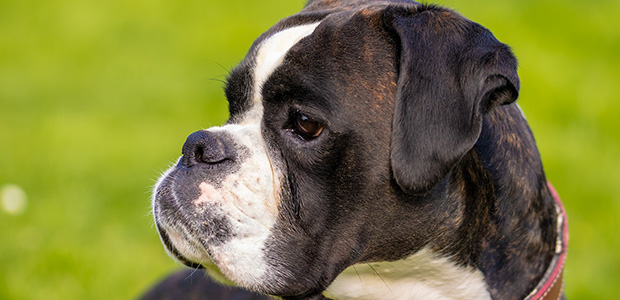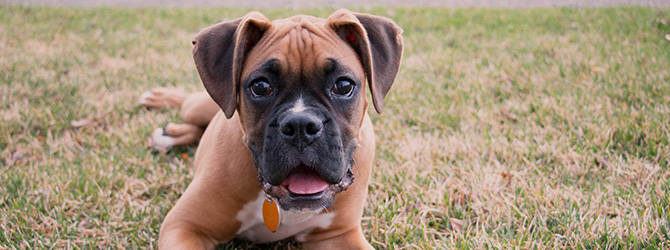The Boxer: thinking of getting a Boxer?
Curious, fun-loving and often a bit silly, Boxers make for hugely rewarding pets and will keep their owners entertained for hours.
Let’s take a closer look at the Boxer.
Place of origin: Munich, Germany
How big do Boxers get? 53 – 63cm
How heavy are Boxers? 25 – 32kg
Life Expectancy: 10 – 12 years
Colour: Fawn, Brindle, White
Please note: A dog’s exercise, training/stimulation and grooming requirements can depend on several factors such as age and health. The same goes for ongoing costs of ownership. For advice on one specific dog, we always advise chatting with a vet.
How much exercise does a Boxer need?
Boxers are large dogs that love to put their muscular builds to good use. Owners of Boxers will find that no amount of exercise is too much, but that a minimum of 2 good-sized walks a day should suffice – interspersed with some active playtime of course!
If you’re looking for a canine friend to accompany you on long walks or other outdoor adventures, a Boxer may be the breed for you.
Training: how to train a Boxer
Happy, bouncy and often not reaching maturity until 3 years of age, it can be difficult to get a young Boxer to take training seriously. However, persistence and positive reinforcement should see owners and their Boxer work out a routine that benefits both.
Boxers love play, so it’s a good idea to use play as an incentive/reward for positive behaviour.

Grooming: do Boxers shed?
The Boxer’s sleek, shorthaired coat is easy to care for at home. Weekly grooming with a soft brush or mitt will suffice, and Boxers are even known to groom themselves! Bathe your Boxer only when needed.
As with most breeds, Boxers benefit from regular tooth brushing, nail clips and ear checks.
Boxer temperament, socialising and ideal home environment
Boxers are fun-loving pets – the perfect companion for a trip to the park! Coupled with their muscular build, their excited boisterousness might see them colliding with younger children, but a Boxer would make the perfect companion for families with older children who can participate in play.
Boxers may be wary of strangers but by and large, they’re incredibly friendly dogs towards humans and other pets. They may be inclined to protect their owners or pack members, but a well-adjusted Boxer who’s been exposed to plenty of different people and pets is very unlikely to cause problems.
Cost of owning a Boxer
When you’re considering the lifetime cost of owning a Boxer, remember to take into account:
- Breed-specific food
- Veterinary care
- Pet insurance
- Kennels or dog sitters
- Regular grooming costs
- Toys and equipment
- Preventative healthcare
As a rough guide, allow between £80 and £120 a month to cover the ongoing costs of owning a Boxer. Our vets have drawn up this handy guide to save dog owners money.
Need more info?
For more info on finding the best dog breed for you and your lifestyle, have a chat with your vet.
Find your nearest vet using our Find a Vet page, or speak to a vet online using Online Vets.

